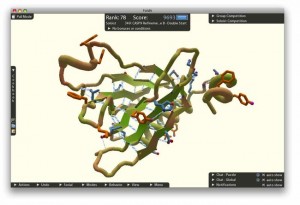 A recent article in Nature concerning the protein folding videogame Foldit — a collaboration between UW CSE professor Zoran Popovic, UW Biochemistry professor David Baker, and their students — has stimulated a great deal of coverage in the popular press. A superb article appears in today’s New York Times.
A recent article in Nature concerning the protein folding videogame Foldit — a collaboration between UW CSE professor Zoran Popovic, UW Biochemistry professor David Baker, and their students — has stimulated a great deal of coverage in the popular press. A superb article appears in today’s New York Times.
“The Foldit project was inspired by the volunteers who were contributing the downtime on their home computers to power a protein-folding program called Rosetta@home. The computer donors could see the progress of the program on their screens, and they began to note inefficiencies in the software’s folding approach. That led the scientists to look for ways to systematically harness the skills of the human volunteers.
“The University of Washington researchers have now received a $14 million grant from the Defense Advanced Research Projects Agency, the Pentagon’s arm for supporting science and technology research. This fall Dr. Popovic plans to establish a Center for Game Science, which will pursue technologies for using the skills of both novice and expert human game players on a range of scientific problems.”
Read the complete New York Times article here. Play Foldit here. Read other coverage stimulated by the Nature paper here.

